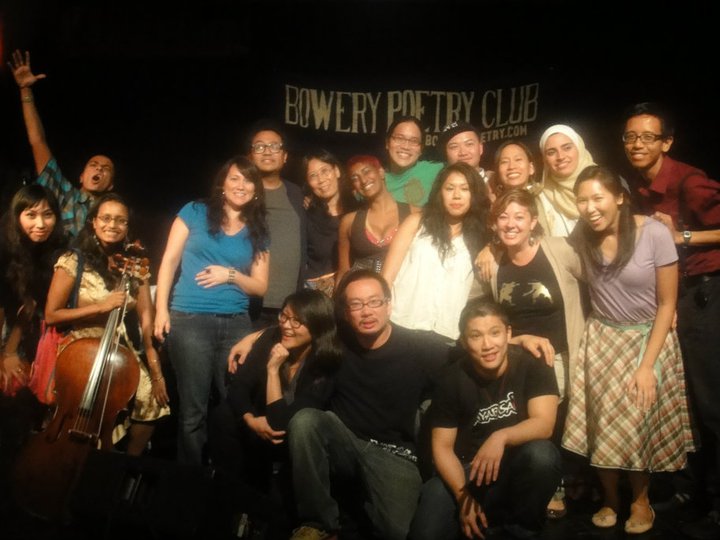“Pretense is not allowed here.”
~ Taiyo Na, Artistic Director, The Sulu Series
To call The Last Sulu Series at the Bowery Poetry Club in New York City (which took place on September 19, 2010) anything other than an electric family reunion would be a grave understatement. A quick scan of the packed house revealed shaved heads, piercings and tattoos, women with hijabs, children, hip-hop/funk-and-punked out rockers and tastemakers, not to mention classy nerds, aunties and students. We were at the basement art gathering of the century. The Sulu Series’ Artistic Director, Taiyo Na, began with a brief history of the event, fighting back tears welling up his eyes (a common occurrence throughout the evening). He shared the story of Sulu’s loyal photographer, Derek Srisaranard, whose first words after a near-fatal accident were something to the effect of: “Sulu. I need to be there and see it again. I have to capture it.”
Derek’s images have constituted an unparalleled photo archival project documenting AAPI artists who have traversed the Sulu Series stage. Through cycles of tears and joy, the reverence for spoken word poetry legend—or “community celebrity” as my Sulu DC co-director, Jenny C. Lares, and I like to call him—Regie Cabico and his life’s work was palpable.
The artists, who exposed their most vulnerable selves on stage, paid homage to Taiyo Na, DJ Boo and the many other forces who’ve kept The Sulu Series vibrant throughout its five-year history. What began as a benefit that raised $10,000 for the forgotten AAPIs affected by Hurricane Katrina emerged as a legacy that will be remembered fondly by all who were fortunate enough to perform there or attend. But artistic director, Taiyo Na, says the New York Sulu Series has “graduated.”
Among the performers at The Last Sulu Series, emcee Koba launched the show with a vocal quality much improved since the last time I saw him perform. His style now reminds me of Aesop Rock, a white, Jewish rapper from New York whose narratives walk the line between the abstract and the intensely personal, much like Koba’s. Next up was Vinh Hua, a poet who confessed to having “grown up with Sulu Series,” and lamented:
“24 million people [in New York City] and still you can feel horribly lonely.”
The intensity rose with Michelle Myers, one-half of the well-known spoken word duo, Yellow Rage, as she read a new poem called “Take it Back,” a charged love letter to South Philly High School students whose race relations deteriorated into violence and alienation. She called on the listener to “take back” the hurtful words and deeds, and stop fighting an “Oppression Olympics.” A bit more light-hearted, although equally political, was John-Flor Sisante’s “A Love Song During the Third Term of the Palin Presidency,” a surreal fabricated universe in which the ukelele-playing, violently stomping singer freely belted out:
“You looked at me like a cigarette that burns through my skin.”
This quintessential geek with his suspenders and thick, rectangular black frames was also reflecting a new Asian cool. A cool that says, “You don’t have to like it, but I dare you to tell me I don’t rock on this little wooden instrument.”
Continue reading “Sulu Spotlight: The Last Sulu Series, New York City”
